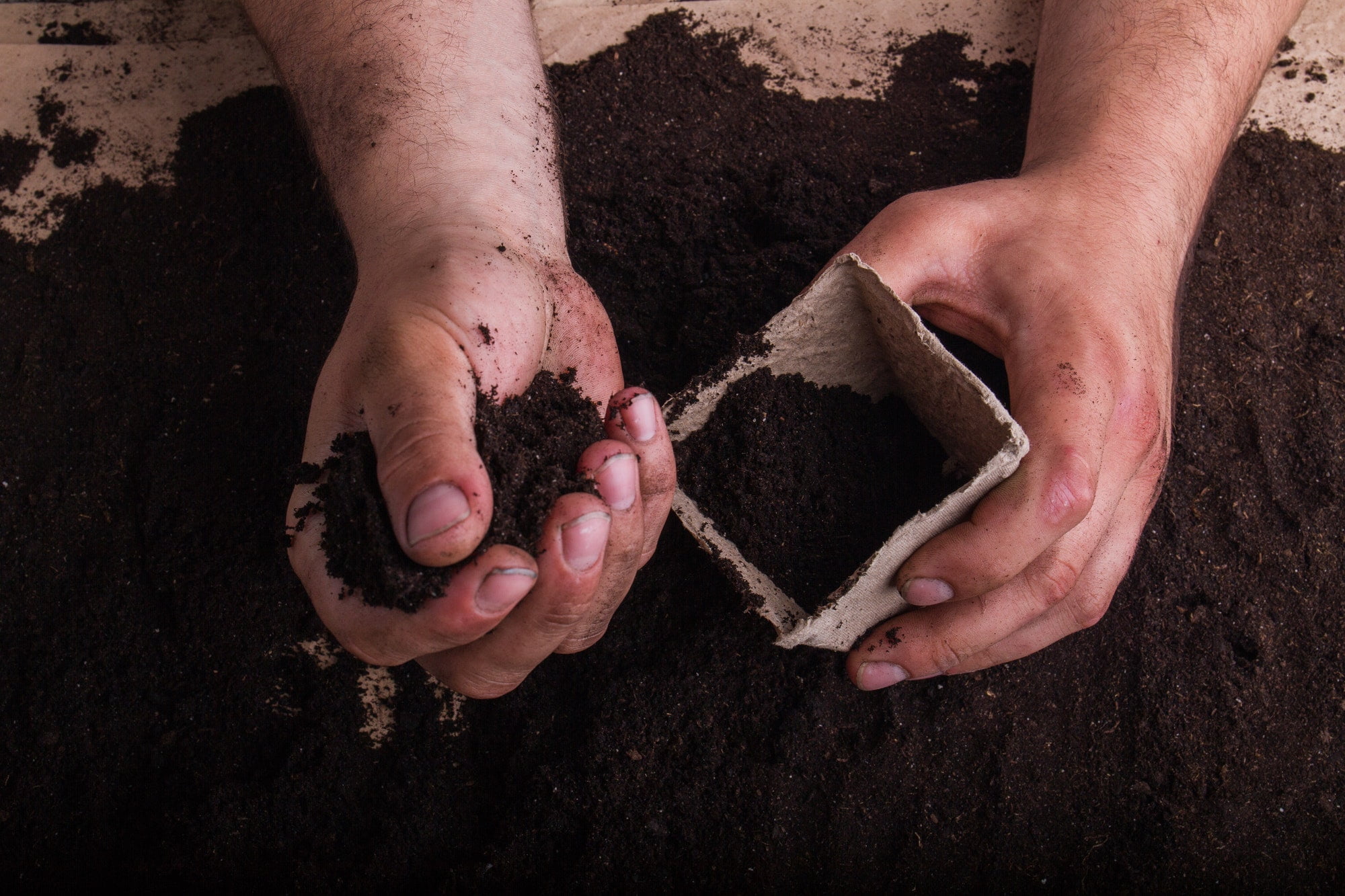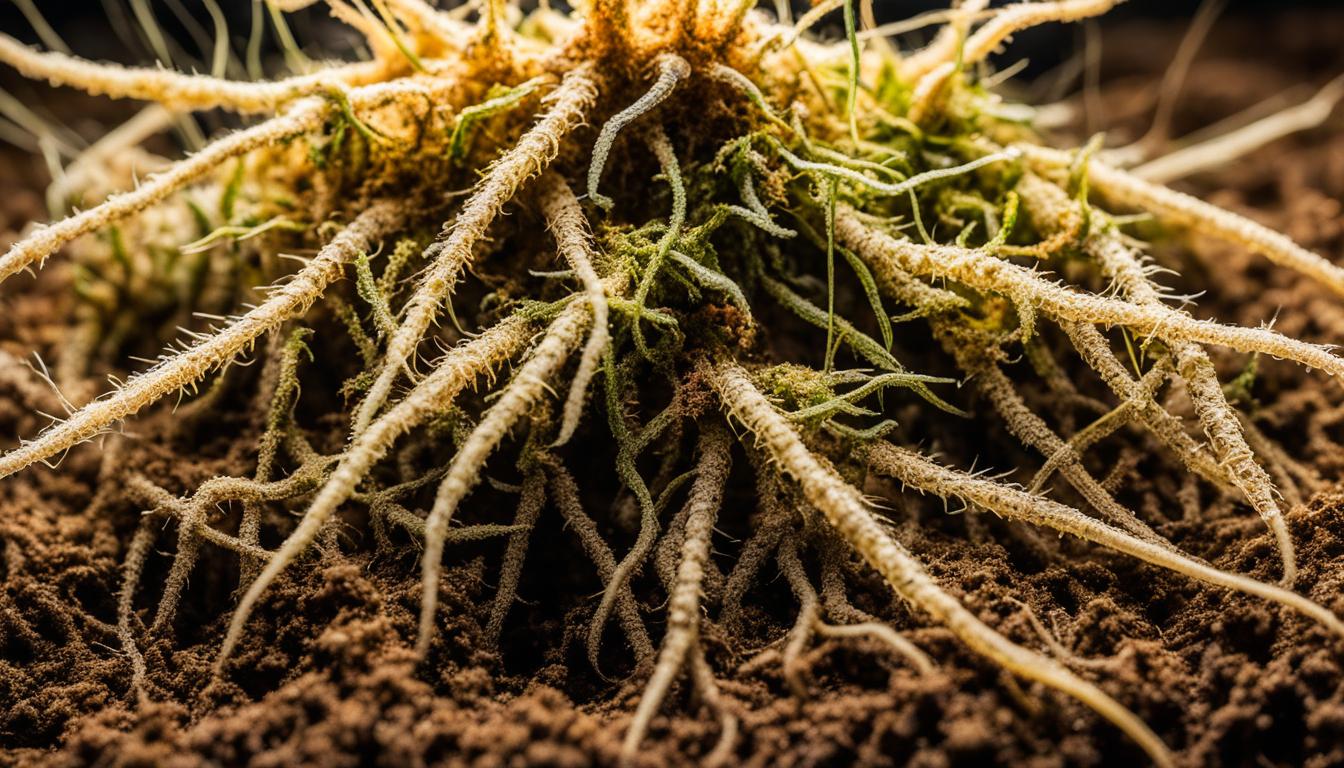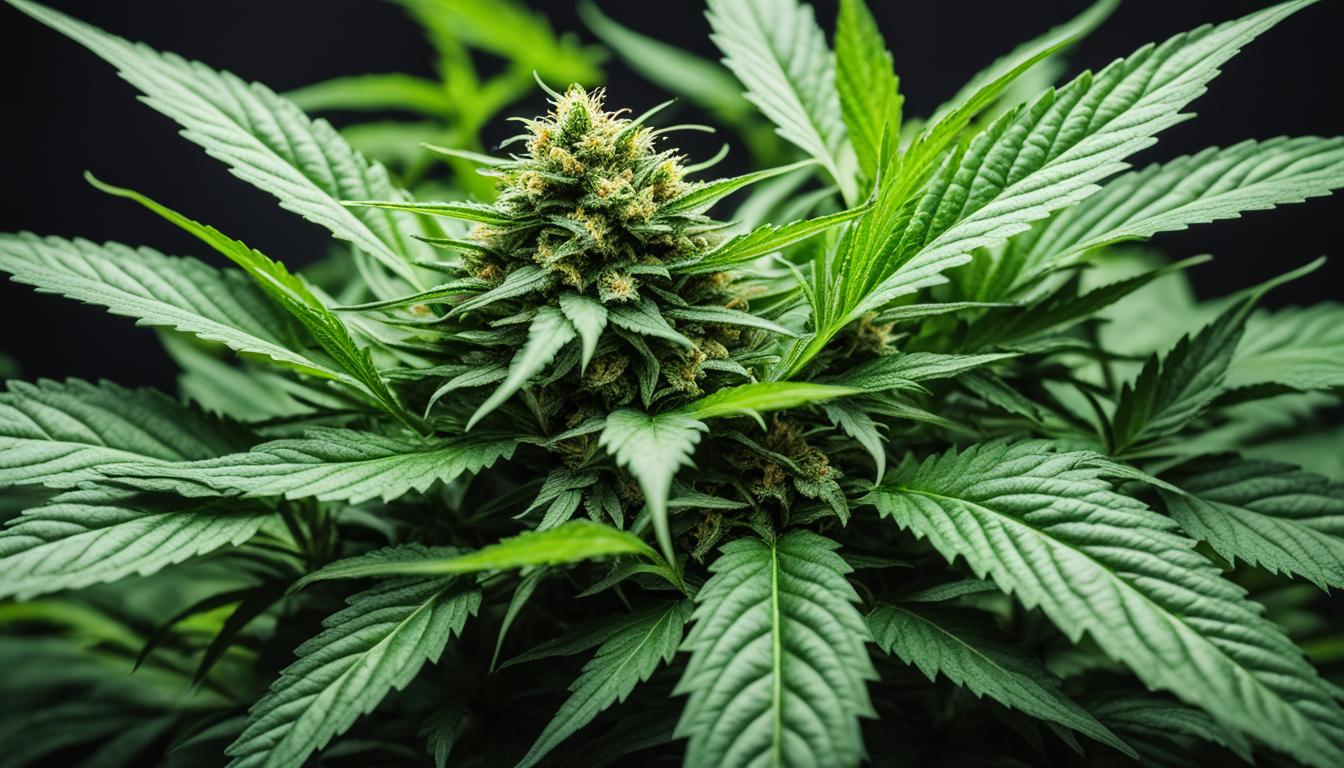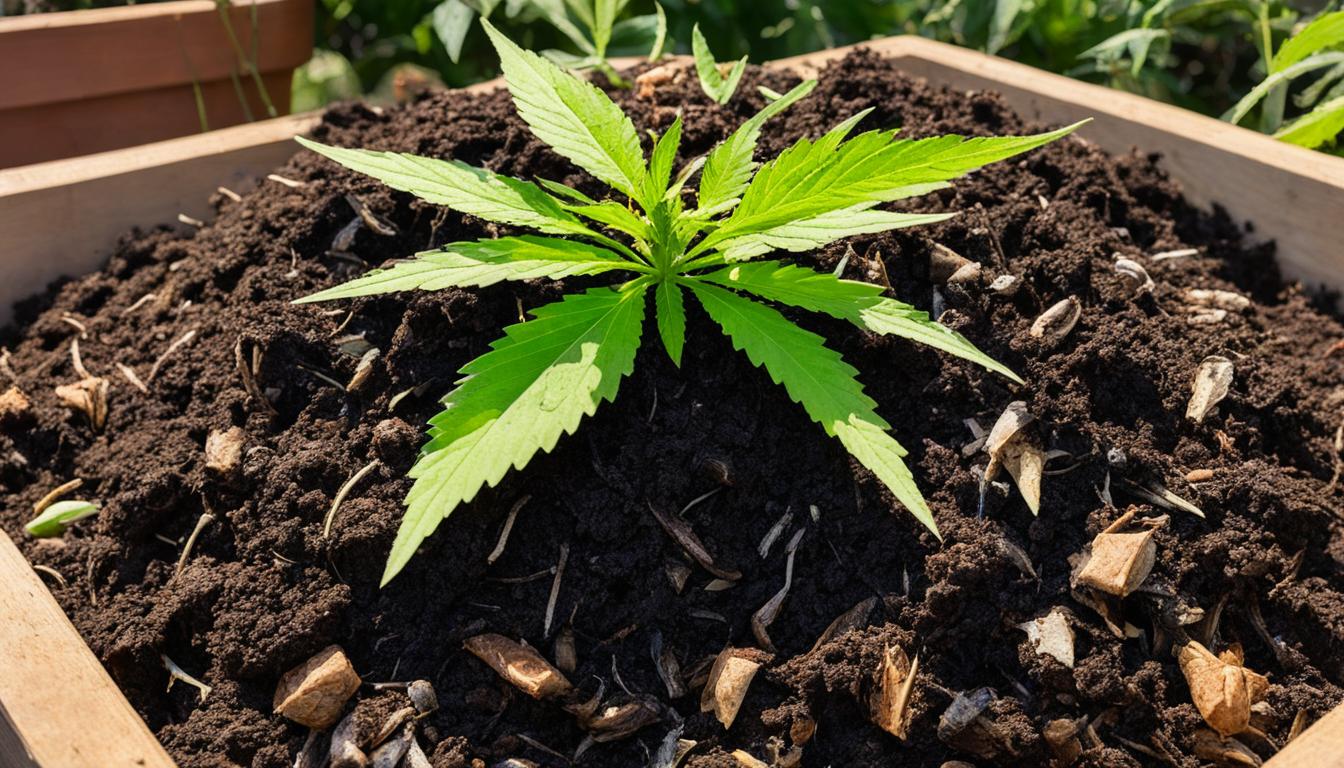
Contents
- 1 The Essential Guide to Cannabis Compost and Soil Health
- 1.1 The Importance of Soil pH and Compost Ingredients for Cannabis
- 1.2 Enhancing Soil Aeration Techniques and Water Retention for Cannabis
- 1.3 Unlocking the Power of Bokashi: Revolutionizing Soil Health with Southern Oregon Bokashi
- 1.4 The Role of Compost Tea and Cannabis Soil Nutrition
- 1.5 Sustainable Cannabis Soil Practices and DIY Composting
- 1.6 The Benefits of Cannabis Soil Microbes and Fertility
- 1.7 Conclusion
- 1.8 FAQ
- 1.8.1 What is the role of soil health in cannabis cultivation?
- 1.8.2 How does composting improve cannabis soil health?
- 1.8.3 What is the ideal pH range for cannabis soil?
- 1.8.4 What are the essential ingredients for cannabis compost?
- 1.8.5 How can soil aeration and water retention be improved for cannabis plants?
- 1.8.6 What is compost tea and how does it benefit cannabis soil?
- 1.8.7 How can sustainable practices be implemented in cannabis cultivation?
- 1.8.8 What is the role of soil microbes in cannabis soil fertility?
- 1.8.9 How can organic matter contribute to cannabis soil fertility?
The Essential Guide to Cannabis Compost and Soil Health
At industry-leading, we understand that organic cannabis cultivation requires a strong focus on soil health. To achieve thriving cannabis plants, high-quality organic soil is essential. The soil food web, which consists of microorganisms, insects, and larger creatures, plays a crucial role in breaking down organic matter and making nutrients readily available to the plants. By nurturing soil life and avoiding destructive practices like tilling and the use of chemical fertilizers, we can create an optimal environment for cannabis growth.
In this comprehensive guide, we will explore various techniques and methods for organic cannabis composting and enhancing soil health. From the benefits of organic compost to the importance of soil pH and aeration, we’ll cover everything you need to know to cultivate healthy and high-yielding cannabis plants.
Key Takeaways:
- Organic soil is crucial for thriving cannabis plants.
- The soil food web, consisting of microorganisms, insects, and larger creatures, breaks down organic matter and makes nutrients available to the plants.
- Avoid destructive practices such as tilling and the use of chemical fertilizers.
- Effective methods of feeding cannabis organically include composting, worm composting, and the use of manure.
- Techniques like mulching, compost tea, and foliar sprays enhance soil health and promote optimal cannabis growth.
The Importance of Soil pH and Compost Ingredients for Cannabis
When it comes to successful cannabis cultivation, soil pH and compost ingredients play a critical role. Let’s explore why these factors are essential for achieving optimal plant growth.
The Significance of Soil pH
Soil pH refers to the level of acidity or alkalinity in the soil. For cannabis plants, maintaining the right pH is crucial, as it directly influences nutrient availability and plant health. The ideal pH range for cannabis cultivation is between 6 and 7.5.
Compost, which is highly beneficial for soil health, can help stabilize pH fluctuations. When added to the soil, compost acts as a buffer, maintaining a favorable pH range for cannabis plants. This ensures that essential nutrients are readily available for uptake by the roots.
Optimal Compost Ingredients
Choosing the right ingredients is key to producing high-quality compost for cannabis cultivation. A well-balanced compost mix consists of both green and brown materials.
Green materials, such as grass clippings and fruit and vegetable scraps, provide nitrogen, while brown materials, such as woodchips and dead leaves, contribute carbon. Achieving the right ratio is essential for effective composting.
A balanced compost mix typically consists of:
- 25-50% green material
- 50-75% brown material
This mix ensures a rich source of nutrients and creates an optimal microenvironment for the microorganisms involved in the composting process.
Cannabis pH and Compost Ingredients Table
| Soil pH | Compost Ingredients |
|---|---|
| Ideal Range: 6 – 7.5 | 25-50% green material (grass clippings, fruit and vegetable scraps) 50-75% brown material (woodchips, dead leaves) |
As shown in the table above, maintaining the ideal soil pH for cannabis while using a balanced mix of compost ingredients is crucial for optimal plant growth. Let’s move on to the next section to explore techniques to enhance soil aeration and water retention for cannabis cultivation.
Enhancing Soil Aeration Techniques and Water Retention for Cannabis

Adequate soil aeration and proper water retention are crucial for the health and vitality of cannabis plants. In this section, we will explore techniques to improve soil aeration and water retention to optimize the growing conditions for your cannabis plants.
Enhancing Soil Aeration
Soil aeration is essential for healthy cannabis root development. One way to improve soil aeration is by harnessing the power of worms. These amazing creatures create tunnels in the soil, allowing air and water to penetrate deeply. This promotes the exchange of gases, improves nutrient uptake, and enhances overall soil health.
To encourage earthworm activity in your soil, consider incorporating organic matter such as compost and worm castings. These organic amendments enhance soil structure, creating a favorable environment for worms and other beneficial soil organisms.
In addition to organic matter, soil amendments like perlite or vermiculite can also be used to improve soil porosity. These materials help create air pockets within the soil, increasing air circulation and promoting healthy root growth.
Improving Soil Water Retention
Water is vital for cannabis plants, but maintaining proper water retention in the soil is equally important. Organic matter acts like a sponge, helping the soil retain water and preventing waterlogging.
For improved water retention, consider incorporating materials such as coconut coir or peat moss into your soil. These organic amendments absorb and hold moisture, ensuring that your cannabis plants receive adequate hydration.
By combining appropriate soil aeration techniques with effective water retention strategies, you can create an optimal growing environment for your cannabis plants, promoting healthy root development and overall plant vigor.
Unlocking the Power of Bokashi: Revolutionizing Soil Health with Southern Oregon Bokashi
Bokashi and composting represent two innovative and effective methods of organic waste management and soil enrichment, each with its unique processes and benefits.
Bokashi is a Japanese term meaning “fermented organic matter.” It is a method of composting that uses a specific mix of microorganisms to anaerobically ferment organic waste, including items that can’t typically be composted, like meat and dairy products. This process is usually done in a sealed container and involves adding a Bokashi bran, rich in beneficial microbes, to food scraps. The fermentation process does not produce foul odors and is quick, often taking only a few weeks. The end product of Bokashi isn’t compost but a pre-compost material that needs to be buried in soil or added to a traditional compost pile to finish breaking down. It’s highly nutritious for plants and can significantly improve soil health by increasing microbial activity and nutrient availability.
Traditional composting, on the other hand, is an aerobic process where organic waste decomposes over time with the help of oxygen, water, and naturally occurring microorganisms. It requires a balance of ‘greens’ (nitrogen-rich materials like food scraps and grass clippings) and ‘browns’ (carbon-rich materials like leaves and branches). Composting converts waste into a rich, earthy material that’s excellent for improving soil structure, moisture retention, and nutrient content. The process can take anywhere from a few months to a couple of years, depending on factors like the mix of materials, the size of the compost pile, and environmental conditions.
Both Bokashi and composting offer environmentally friendly alternatives to disposing of organic waste in landfills. They reduce greenhouse gas emissions, recycle nutrients, and create a valuable soil amendment that can help grow healthier plants and restore vitality to depleted soils. Whether you choose Bokashi or traditional composting depends on your needs, the type of waste you generate, and your gardening goals. Both methods complement each other and can be used together to create a more efficient and sustainable cycle of waste and nutrient management.
Southern Oregon Bokashi, found online at sobokashi.com, is a dedicated provider of eco-friendly soil amendment products, specializing in the ancient Japanese art of Bokashi fermentation. Based in the lush landscapes of Southern Oregon, a region renowned for its rich agricultural heritage, the company offers an innovative solution for organic waste management and soil health. Their Bokashi products, a unique blend of natural ingredients, are expertly crafted to enhance soil fertility and promote sustainable gardening and farming practices. Catering to both home gardeners and commercial growers, Southern Oregon Bokashi is committed to fostering a greener, more sustainable future by transforming waste into a valuable resource for enriching the earth.
The Role of Compost Tea and Cannabis Soil Nutrition

Compost tea is an invaluable resource for enhancing cannabis soil nutrition. The process involves steeping compost in water and allowing it to ferment, resulting in a nutrient-rich liquid that works wonders for the health of cannabis plants. This potent elixir can be applied directly to the soil or sprayed onto the leaves, delivering a boost of essential nutrients and beneficial microorganisms.
Compost tea plays a vital role in improving nutrient availability and overall plant health. By increasing the population of beneficial microorganisms in the soil, it creates a thriving ecosystem that enhances nutrient absorption and protects against harmful pathogens.
Incorporating compost tea into your regular feeding regimen can have a significant impact on cannabis plant vitality. It serves as an excellent supplement to other organic fertilizers and can be particularly beneficial during the flowering stage of growth, when plants require an extra dose of nutrients.
“Compost tea is like a superfood for cannabis soil, providing a rich blend of nutrients and beneficial microorganisms that nourish and protect plants.”
Compost tea is also incredibly versatile. It can be customized by adjusting the ingredients to meet the specific needs of your cannabis plants or to address any soil deficiencies. Additionally, by incorporating diverse compost materials, you can further enhance the nutrient profile of the tea.
When applying compost tea, it is essential to ensure thorough coverage of the soil and foliage. This ensures that the nutrients and microorganisms reach the target areas and can be effectively absorbed by the plants. Regular use of compost tea can contribute to improved soil fertility, increased plant vigor, and optimal cannabis growth.
Sustainable Cannabis Soil Practices and DIY Composting
Sustainability is an essential aspect of cannabis cultivation. At [Brand Name], we understand the importance of adopting sustainable soil practices to reduce our environmental impact and create a more eco-friendly growing environment for cannabis. One of the most effective ways to achieve this is through DIY composting, a cost-effective and sustainable approach to sourcing organic matter for cannabis soil.
DIY composting involves the decomposition of kitchen scraps, yard waste, and other biodegradable materials to create nutrient-rich compost. By recycling these materials, we can minimize waste and minimize the need for chemical fertilizers. Homemade compost provides the necessary nutrients for cannabis plants and enhances soil health, promoting optimal growth and sustainability.
Composting is a straightforward process that anyone can do with a little effort and patience. By following a few simple steps, you can create your own homemade compost to nourish your cannabis plants:
- Gather organic materials such as fruit and vegetable scraps, coffee grounds, eggshells, and yard waste.
- Mix green (nitrogen-rich) and brown (carbon-rich) materials in a composting bin or pile.
- Turn the pile regularly to aerate and promote decomposition.
- Keep the compost moist but not overly wet.
- Allow the compost to decompose over time, typically several months
This homemade compost can then be incorporated into your cannabis soil, providing a sustainable source of nutrients. It improves soil structure, enhances moisture retention, and encourages the growth of beneficial microorganisms.
We believe that sustainable practices extend beyond composting. By recycling and reusing materials, conserving water, and minimizing waste, we can create a more sustainable cannabis cultivation operation. These practices align with our commitment to environmental stewardship and help us cultivate cannabis with a smaller carbon footprint.
DIY composting allows us to create our own sustainable cannabis soil, reducing our reliance on external sources and minimizing our environmental impact. It’s a win-win for both our plants and the planet.
To illustrate the benefits of sustainable cannabis soil practices and DIY composting, we have prepared a comprehensive table summarizing the advantages:
| Advantages of Sustainable Cannabis Soil Practices |
|---|
| Nutrient-rich soil improves plant growth and overall plant health |
| Promotes the growth of beneficial soil microorganisms |
| Enhances soil structure, leading to better aeration and water retention |
| Reduces dependence on chemical fertilizers |
| Minimizes waste and conserves resources |
| Creates a more sustainable and eco-friendly growing environment |
By implementing sustainable cannabis soil practices and DIY composting, we can ensure the long-term health and productivity of our cannabis plants while positively impacting the environment. Together, we can cultivate cannabis in a responsible and sustainable manner.
Join us in our commitment to sustainable cannabis cultivation
We invite you to become a part of our sustainable cannabis community. By adopting sustainable soil practices and DIY composting, we can make a difference in the environmental impact of our industry. Let’s work together to promote a healthier planet and cultivate cannabis with care.
The Benefits of Cannabis Soil Microbes and Fertility
In the world of cannabis cultivation, soil microbes are the unsung heroes. These microscopic organisms, such as bacteria and fungi, play a vital role in maintaining the fertility of cannabis soil. Their contribution to nutrient cycling, disease suppression, and overall soil health cannot be overstated.
One group of soil microbes that deserves special attention is mycorrhizal fungi. These fungi form symbiotic relationships with the roots of cannabis plants, creating a network of fine filaments that extend into the soil. This fungal network helps plants access nutrients more efficiently, improving nutrient uptake and enhancing plant resilience.
By fostering a diverse and thriving microbial community in the soil, cannabis growers can ensure optimal plant growth and productivity. These beneficial soil microbes work in harmony with the plant, building a mutually beneficial ecosystem that supports plant health and vitality.
So how can we promote the abundance of these beneficial soil microbes? One effective method is through organic composting. By incorporating compost into the soil, we provide a rich source of organic matter that nurtures the microbial community. Compost acts as food for the microbes, creating an environment where they can thrive and carry out their essential functions.
Mulching is another practice that can support the growth of soil microbes. By covering the soil with a layer of organic matter, such as straw or wood chips, we create a protective barrier that nourishes the microbial community and helps to retain moisture in the soil.
Avoiding the use of harmful chemicals is yet another way to promote the abundance of beneficial soil microbes. Chemical pesticides and fertilizers can disrupt the delicate balance of the soil ecosystem, harming the beneficial microbes in the process. Opting for organic and natural alternatives allows the microbial community to flourish and contribute to the soil’s fertility.
In summary, cannabis soil microbes are a key component of soil fertility. By fostering a diverse microbial community through organic composting, mulching, and avoiding harmful chemicals, we can cultivate soil that is rich in nutrients and teeming with life. This thriving soil ecosystem promotes optimal cannabis growth and contributes to the overall health and vitality of our plants.
Conclusion
In conclusion, organic cannabis composting and soil health are crucial elements of successful cannabis cultivation. By focusing on organic soil practices, we can create a sustainable and eco-friendly growing environment for our cannabis plants. Incorporating compost, compost tea, and other organic amendments provides the necessary nutrients for optimal growth and yields.
When it comes to maintaining the fertility of our cannabis soil, balancing pH levels, improving soil aeration and water retention, and promoting the abundance of beneficial soil microbes are key. By implementing these practices, we can ensure that our plants have access to the nutrients they need, while minimizing the use of harmful chemicals and reducing our environmental impact.
By embracing eco-friendly cannabis growing practices, we benefit not only our plants and the environment but also our own health. Organic matter in cannabis soil helps to maintain the natural balance and biodiversity of the soil ecosystem, leading to healthier and more robust plants. Additionally, by avoiding the use of synthetic fertilizers and pesticides, we can reduce our exposure to potentially harmful chemicals.
Overall, by prioritizing organic cannabis composting, enhancing soil health, and being mindful of our environmental impact, we can cultivate high-quality, eco-friendly cannabis while supporting the long-term sustainability of our soil and ecosystems.
FAQ
What is the role of soil health in cannabis cultivation?
Soil health is crucial for successful cannabis cultivation as it provides the necessary nutrients and support for optimal plant growth. High-quality organic soil promotes the overall health and vitality of cannabis plants, leading to higher yields and better-quality harvests.
How does composting improve cannabis soil health?
Composting is an effective method of improving cannabis soil health as it enriches the soil with organic matter and essential nutrients. Compost helps to feed the soil food web, which includes beneficial microorganisms and insects that break down organic matter and release nutrients for plants to absorb. Additionally, composting can help buffer pH fluctuations and create an optimal microenvironment for soil life.
What is the ideal pH range for cannabis soil?
The ideal pH range for cannabis soil is between 6 and 7.5. Maintaining a favorable pH helps ensure that essential nutrients are readily available to the plants. Compost, rich in organic matter, can help buffer pH fluctuations and maintain the desired pH range for cannabis plants.
What are the essential ingredients for cannabis compost?
A balanced mix of green and brown materials is important for cannabis compost. Green material includes grass clippings, fruits, and vegetables, while brown material consists of woodchips and dead leaves. The compost mix should consist of 25-50% green material and 50-75% brown material to provide the necessary nutrients and create a favorable environment for composting microorganisms.
How can soil aeration and water retention be improved for cannabis plants?
Soil aeration can be improved by incorporating organic matter such as compost and worm castings, as well as using soil amendments like perlite or vermiculite. These materials help improve soil structure and increase air circulation. Water retention can be enhanced by incorporating materials such as coconut coir or peat moss, which act as sponges to retain water in the soil and prevent waterlogging.
What is compost tea and how does it benefit cannabis soil?
Compost tea is a nutrient-rich liquid created by steeping compost in water and allowing it to ferment. It increases beneficial microorganisms in the soil, improves nutrient availability, and enhances overall plant health. Compost tea can be applied to the soil or sprayed onto the leaves as a supplement to other organic fertilizers, providing cannabis plants with essential nutrients and promoting their overall vitality.
How can sustainable practices be implemented in cannabis cultivation?
Sustainable practices in cannabis cultivation include recycling and reusing materials, conserving water, minimizing waste, and adopting eco-friendly methods such as DIY composting. By composting kitchen scraps, yard waste, and other biodegradable materials, growers can create their own nutrient-rich compost, reducing the need for chemical fertilizers and minimizing their environmental impact.
What is the role of soil microbes in cannabis soil fertility?
Soil microbes, including beneficial bacteria and fungi, play a crucial role in cannabis soil fertility. They contribute to nutrient cycling, disease suppression, and overall soil health. Mycorrhizal fungi, in particular, form symbiotic relationships with cannabis plant roots, improving nutrient uptake and enhancing plant resilience. Creating a diverse and thriving microbial community in the soil is essential for optimal cannabis growth.
How can organic matter contribute to cannabis soil fertility?
Organic matter in the soil acts as a source of nutrients and promotes soil fertility for cannabis plants. It improves soil structure, enhances water retention, and supports the abundance of beneficial soil microbes. By incorporating organic matter through composting, mulching, and using organic amendments, growers can maintain fertile soil and provide the necessary nutrients for healthy cannabis plants.




